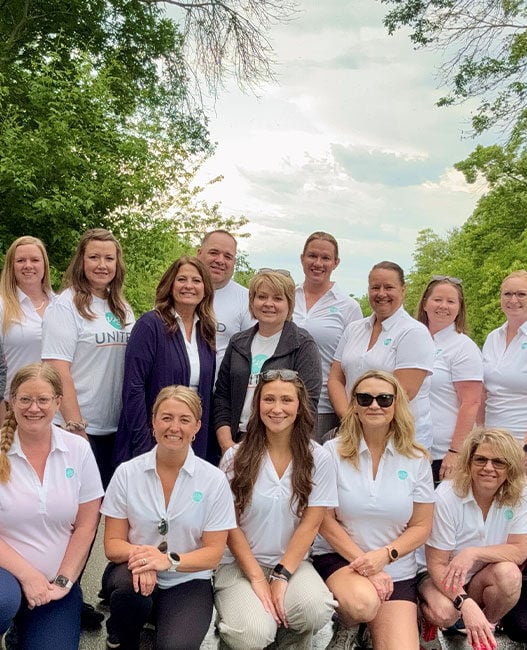International Women’s Day (IWD) has its roots in the labour and suffragette movements. It was first celebrated in 1911 in Austria, Denmark, Germany, and Switzerland, where over one million women and men attended rallies campaigning for women’s rights to work, vote, be trained, hold public office, and end discrimination. However, in the 1900s women’s rights were few, and opportunities were sparse.
Since then, IWD has evolved to encompass a broader agenda, advocating for gender equality across all spheres of life, including science, technology, engineering, and mathematics (STEM), yet the curious and creative women who enter the world of STEM still, over 100 years later, face barriers to entry and advancement.
The wave of change
It is important to use IWD as a platform to showcase the highs, the lows, the progress made, and the room for improvement. And, positively, a wave of change is underway, with several companies setting benchmarks for gender inclusivity.

Linda Johnson, Executive Vice President, Operations, DigiKey,
Reflecting on the evolution of women entering the STEM industry, Linda Johnson, Executive Vice President, Operations, DigiKey, shares: “The industry is evolving, and we’re seeing more emphasis on encouraging young women in STEM programmes. The electronics industry is very established and mature, especially in the US, and that, at times, can get in the way because you see a lot of the same talent moving around. There’s a lot of opportunity for leaders to be very conscious of that and to seek out more diverse viewpoints and potential hires so that we can start adding to the talent pool. A mix of industry experience and new, diverse talent will help the industry continue to grow and be successful.
“There are a lot of women who now are involved, from an early age, in STEM. There’s a lot more focus on engineering, robotics, and the maker space, and both males and females are very involved in that area. The tide is turning in that engineers aren’t just primarily male. I see many more young women and girls interested and encouraged in that direction.”
Companies leading on gender inclusion

Sarah Chapman, Technical Manager and 3M North Europe STEM Champion
Companies like DigiKey and 3M are perfect examples of giants at the helm of fostering gender inclusivity within the STEM industries.
Their strategies are multifaceted, focusing on targeted recruitment, professional development programmes, pay equity, and creating inclusive cultures. They have recognised the value of fostering a culture that not only welcomes diverse talent but also nurtures it.
By embedding DEI principles into their core business strategies, DigiKey and 3M are setting benchmarks for the industry, demonstrating that inclusive practices contribute significantly to innovation, employee satisfaction, and overall business success. Their commitment to DEI extends beyond rhetoric, manifesting in comprehensive programmes and practices aimed at attracting, retaining, and developing a diverse workforce.
DigiKey, renowned for its electronic component distribution, has taken significant strides in embedding DEI into its corporate ethos. Sharing the ways in which DigiKey are recognising and encouraging a diverse talent pool, Johnson said: “DigiKey recognises the importance of diverse leadership. The first step to encouraging and bringing more women into the industry and in leadership roles is to recognise that there’s disparity. Beyond that, it can’t be just about ‘checking a box,’ as you see happening in some companies. It’s about making a conscious effort to have a diverse pool of talent to review, looking at your needs in a role and team, being aware of your biases, and then hiring the best person for it. DigiKey actively supports STEM education programmes, robotics teams, makers, and college-level programmes to increase awareness of the engineering field for everyone and is a big supporter of WE (Women in Electronics) to encourage more women in the field.”
However, more than just recognising the need for talent and encouraging more diversity to join the company, DigiKey embed their principles into the very fabric of their culture, as Johnson shares.
“A great example of inclusion reflected in our culture is DigiKey’s partnership with Women in Electronics, which is impacting people at all levels, from organisation-wide to people’s lives outside of work. From gaining a new community to supporting personal and professional growth, participants are quick to rave about their experiences.
“The programme connects women across the company who would otherwise not have the chance to meet. It also reinforces community ties between the employees and opens networks of collaboration across departments.
“DigiKey employees can connect beyond the organisation. They can talk with peers and mentors about personal and professional growth, as well as gain deeper industry insights. One of the key themes members have noticed is how everything is connected in the industry, like between rep firms, ODMs, and distribution. These diverse views are helping people thrive in their roles and continue to ensure DigiKey is a global leader.”
Similarly, 3M, a global pioneer in innovation, has ensured DEI is at the core of its corporate identity.
Sarah Chapman, Technical Manager and 3M North Europe STEM Champion, reflects on her experience and the importance of inclusive practices.
“As a materials science-based company, 3M relies on data to inform its priorities; research has proved that equity is a superior growth model for our company and our communities. This has informed our global priorities (Equity and Community | 3M), including our commitment to creating five million STEM and skilled trades learning experiences for underrepresented individuals, including women and girls, by the end of 2025; and our goal to double diverse representation globally. “In my TEDx talk, I reflected that, as a woman technical manager, I am in the minority. The WISE Campaign reported that in the UK, managerial roles within the science, engineering, and technology industries remain overwhelmingly male-dominated with women accounting for less than 20%. However, reflecting on my experience over the last ten years of my management career at 3M, I have never felt alone. I have women role models in senior leadership, women managers in my team, and mentors and allies of all gender identities. “Sadly, my experience – being unusual in the industry – is why I am so passionate about sharing what it can look like to have women and other underrepresented groups thriving in a business that relies on collaboration and inclusion to generate innovative ideas and aims to reflect the diversity of its customers, suppliers, and communities.”
“3M has active Employee Resource Networks including a vibrant, influential Women’s Leadership Forum and I had the privilege to chair its EMEA Technical Chapter in 2022 and 2023. During this time, we delivered hashtag#IAmRemarkable workshops to over 500 members, launched a podcast series called ‘Talking With Women in Tech’, and hosted virtual events that brought women and male allies from across the world together to discuss topics impacting technical women leaders. We also heard from inspirational role models such as Jayshree Seth, our Chief Science Advocate.”
The business case for gender inclusion
Gender-diverse teams bring a plethora of perspectives and ideas, which creates an environment that is ripe for innovation, and, as we should be aware by now, it is this diversity of thought that is crucial in the fast-evolving electronics and tech industries, where staying ahead of the curve is vital. Moreover, companies like DigiKey and 3M, who are championing gender inclusivity often enjoy enhanced reputations, attracting top-tier talent and loyal customers who value social responsibility.
Speaking on the importance of leading on gender inclusion, Johnson shares: “DigiKey and other leading companies need to lead the way for many reasons. As a large employer, we have the opportunity and responsibility to lead the way in what is right. Many studies prove that the higher a company’s gender composition, the better it performs in relative returns. Companies whose top management is at least half female see returns on equity that are 19% higher on average. Many other studies prove support for diversity as well.”
Creating an inclusive culture is paramount, and involves supporting employee resource groups, providing education on unconscious bias, and establishing safe channels for reporting discrimination. These measures not only facilitate a more inclusive workplace but also contribute to employee satisfaction and retention, further enhancing business outcomes.
Speaking on 3M’s approach, Chapman comments: “3M’s more formal approach and commitment to diversity and supporting the progression, inclusion, and engagement of women and other underrepresented groups is also critical – for example, our globally recognised ‘Work Your Way’ flexible working approach which, for me personally, has been the difference between advancing in rather than leaving the technical leadership workforce since having a family. We also provide numerous volunteering opportunities for our employees including our 3M Visiting Wizards programme, 3M STEM Ambassadors, and, new for 2024, a partnership with Greenlight for Girls to run STEM workshops close to three of our manufacturing sites and our head office location. As a strategic partner of the British Science Association, we are also proud to have supported their hashtag#smashingstereotypes campaign, to elevate and celebrate the diverse people working in STEM careers. In my experience, these policies work well and have been embraced largely because of the company ethos which has fuelled our innovative spirit for over 100 years – a culture of collaboration, trust, freedom to innovate, learn from failure and use initiative, respect for diversity, and celebration of difference.”
Why we must continue the push for inclusion
“I passionately believe that good ideas can come from anyone, anywhere, regardless of race, age, gender identity, sexuality, or societal group – research shows that diversity drives innovation, and it is important for companies like 3M to have wider representation in science and pioneer the policies and practices that will enable industry to advance in a way that tackles the world’s most pressing problems,” said Chapman.
Companies have the opportunity to lead by example, creating a blueprint for others to follow suit. The efforts of DigiKey and 3M showcase what is possible when inclusivity is woven into the culture. However, the journey does not end here; continuous evaluation, adaptation, and commitment are required to achieve the ultimate goal of gender parity in STEM.
As we move forward, let’s use International Women’s Day not only to celebrate the achievements made but also to recommit to the actions needed to create a more inclusive and equitable STEM landscape.
When we support and include all talents, the possibilities are limitless.















